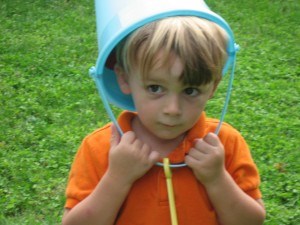
When we sit down to dinner as a family, we often go around the table and share one good thing about our day. But last night I decided, on the suggestion of a book I'm reading, to ask everyone, "What's one mistake you made today?" The idea is that we start giving our kids freedom to admit their mistakes early on in their lives, before they've learned to try to hide them, before they think they'll get in trouble for them, before any latent perfectionism sets in. Furthermore, Peter and I are supposed to offer examples of mistakes we made so our kids know that we're all in this being human business together.
William volunteered to go first. "I didn't make any mistakes today," he announced. "But Penny scratched someone at school."
This was not the conversation I had planned.
"William, you need to focus on you, not on Penny."
"But she scratched someone. And she pushed."
"That's not the point. What mistake did you make today?"
"I didn't make any mistakes."
I suggested that perhaps stomping his feet, bursting into tears, and yelling when Penny touched the matching game he had set up on the playroom table was a mistake. He shrugged.
Penny deferred. "Maybe when I'm done eating," she said.
At this point, they aren't very willing to talk about mistakes. They share the excitement of going to watch a school play. William comes up with statements like, "Mom! God gave us shoulders for our arms won't fall onto the ground!" Penny declares, "There was a fire drill in school and I wasn't even scared."
Maybe I made a mistake by asking the question in the first place. Still, I want out kids to understand that people make mistakes. When I forgot to pack Penny's water in her backpack, when we take our car into the shop, when I open a cupboard and it nicks William's cheek, they look at me with bewilderment. "Why, Mom? Why did you forget? Why is the car broken? Why did you hurt me?"
I want our kids to understand that they live in a broken world, and that they, and I, contribute to that brokenness. I also want them to understand that they live in a world with a God who loves them in the midst of the brokenness, just as they live with parents who love them no matter what they do. I'm not sure this truth can be communicated through dinner conversation. For now, we'll just talk about the good parts of our day over our evening meal. And we'll try to live out the truth of our brokenness and our redemption.
Support our work. Subscribe to CT and get one year free.














